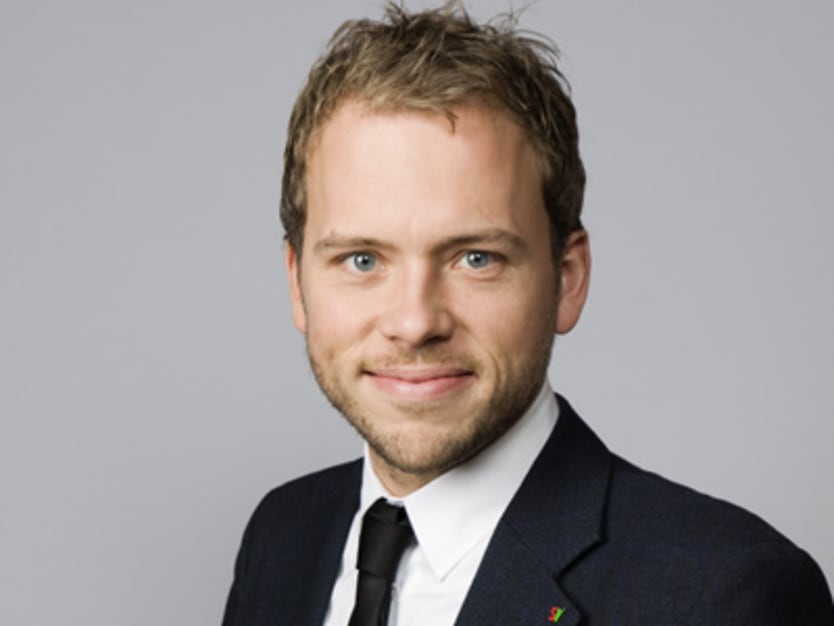
Audun Lysbakken practices what he preaches. As Norway’s first male Minister for Children, Equality and Social Inclusion, he’s proving that “gender equality is not an isolated corner of politics reserved for women” – and he has been carrying that message to developing countries around the globe.
Lysbakken, who took office in October 2009, argues that men have self-interest in women’s empowerment as it not only grants them recognition as fathers and care-givers in the home, but also fuels a nation’s economic development.
“I mean, we have a large oil industry in Norway and some people tend to say that we’re rich because we have oil,” he said. “But I would say we’re rich because we have invested in gender equality and we’ve created enabling structures to promote women’s participation in our economy. And that gives us a more productive economy.”
Throughout his career in the civil service, Lysbakken has been an ardent gender advocate. The 32-year old secured his university degree in comparative politics and French from the University of Bergen in 1998, where he got involved with the Bergen Socialist Left Party as a board member. After serving in various capacities with Norway’s Socialist Youth League from 1998 to 2000, Lysbakken became deputy chair of the Socialist Left Party in 2005.
In an interview with Devex, Lysbakken explained how his country’s lessons on gender equality can help spur growth in the developing world.
What has the response in Norway been to some of your flagship initiatives, on paternal leave and gender quotas?
First of all, quotas are always controversial, and we do still have political debates in Norway over the use of quotas. But I defend them very strongly. We would never have been where we are today when it comes to gender equality without quotas, and we’re continuing to use them. We have introduced a father’s quota in the parental leave scheme and we’re expanding this now, so that a larger part of the parental leave is reserved for fathers. Without that quota, all responsibility for newborn children would still have been with the women.
And at the same [time], we recently introduced new legislation that demanded the private-sector companies – the large companies on the stock exchange – from Jan. 1, 2008, to have at least 40 percent of each gender on their board. Before, I mean [at the] beginning of this decade, there were 7 percent women on the boards of public limited companies in Norway. Now we have 40.1 percent. This would have been impossible without quotas.
Of course, I think you will not achieve more gender equality without political action. And that’s – I mean, you can have a lot of fine, nice ambitions, but you have to have the political will and determination to put through concrete measures to ensure that women are seen. And to me, quotas are a way of showing the competence of women. Because it’s not seen in our societies today, that’s why we have quotas. Quotas is not unfair, it’s a way of creating a more level playing field. It’s a way of combating discrimination, kind of a counter-discrimination, that’s why we need it. I’m not going to interfere in how other countries do their gender-equality policies but what I will say is, without quotas we would never have achieved what we achieved.
During your travels you talk to leaders from developing countries. What are some of the domestic lessons that you share? What’s the kind of responses have you been getting from these leaders?
There have been two points that I’ve been making at the [Commission on the Status of Women], for instance, and in meetings with other ministers, and that’s the point about economic performance.
And then the other one is that we have to … put more emphasis on combating men’s violence against women and children, because the issue of violence is core to solving all other equality problems that we have. I mean, if we don’t combat violence we can never have an equal society. And a lot of governments are now trying to act on this and we are trying to act on this as well. We have a national plan of action against violence but it’s still a huge problem in my country as it is everywhere else and it has to have a lot more focus. Because women will never be able to reach the other goals that we’re aiming for if they are subject to violence.
On the domestic arena, it’s the questions of a better parental leave scheme, reserving more time for fathers, ensuring the rights for fathers to be at home, along with the issue of equal pay. I’ve singled out three issues that are the most important domestically now. It’s more parental leave for fathers, its equal pay for women in our working life – because we see that groups dominated by women are lagging behind – and it’s the violence issue.
And then internationally, our government is currently putting a lot of emphasis into the maternal health issue because it is one of – perhaps the Millennium [Development] Goal – that we’re now furthest away from achieving. So we have to invest more of both political energy and funding into maternal health and into doing something about the fact that giving birth is the most dangerous thing a lot of women in the world can do.
Is the Norwegian government offering any funding schemes for developing countries in support of gender equality?
We are. We’re trying to take particular responsibility on that Millennium Goal and we’re doing that both through funding particular projects and also through being one of the largest funders of the U.N. gender effort, for instance when it comes to funding UNIFEM.
Equality seems to be somewhat in the eyes of the beholder, at least when you look at the different countries or different cultures. How do you convince people that Norway’s approach to equality is a feasible one for them as well, given that they are probably very different from, let’s say, African or Middle Eastern countries?
Well, I don’t accept cultural excuses for not having equality because the truth is all cultures have been traditionally – or at least almost all cultures on all continents – have been patriarchal traditions. And ours as well. Equality is not an aspect of Norwegian culture or a result of Norwegian culture. What we have achieved is a result of political struggle for universal rights and universal values. And I believe that what we have not yet achieved and what we have to achieve will be won the same way, by changing culture. It’s important to see that cultures can be changed, cultures are not static.
I mean a few decades back we would have a lot of traditions in our society that we don’t have anymore. People would be more happy about having a son than having a daughter. It would not be normal for women to have full-time work. It would not be normal for a woman to wear jeans. I mean, you name it. We had all of those traditions; we don’t have them anymore. That’s not because of something specific about Norwegian culture, it’s the result of political struggle and it’s the responsibility of political leaders everywhere to challenge cultures or cultural values that are standing in the way of progress. And that’s not about … importing or accepting Western values. It’s about struggling for some universal values.
Aside from national governments, how can the private sector and cities in developed countries partner with stakeholders in developing countries?
Well, I believe that the private sector has a great responsibility, of course. Because we still see a lack of commitment from many companies when it comes to promoting gender equality and basic human rights when investing in developing countries. I mean, I think local authorities also can take part in this through networking and building relations with municipalities and cities in other countries. But of course, it’s national governments that are the big players here.
I think what is important about the gender equality agenda is that it is not seen as some isolated corner of the development policies, but that we try to mainstream it, and see that if you don’t have a gender perspective in your development policies you might find that they won’t work. It means that when you’re doing education, if you’re giving priority to education in your development corporations – like Norway has done – if you don’t make sure that girls are educated, it will be a lot less successful than if you have that gender perspective. In fact, maybe the one most effective investment we could do in development is to give priority to girls’ education. It has so many positive effects. And the same when it comes to health. I mean, if we fund health projects and don’t see the gender perspective of it, it’s not going to work.
Many of the initiatives that Norway has successfully implemented required some significant financial backing. How do you convince developing countries with major development concerns that it is feasible to incorporate gender issues into their agendas, given their financial constraints?
It’s important for me to underline that the Norwegian welfare state is not only a result of the country getting rich. The country getting rich is also a result of the welfare system, because the welfare state in Norway, the beginning of the construction of the welfare state, started when the country was still a poor country. Norway was, for the first half of the last century, among the poorest nations in Europe. And we began advancing long before the country got wealthy. …
There’s been for too long now an idea in the international development debates that investing in the public sector is counterproductive to development. I strongly believe that trying to create the first steps of a public welfare system is important for development, and that it could on the other hand be market liberalism that could be very dangerous for countries. It’s important to start creating enabling structures for the whole population to take part in the economy if we are to have development and it’s hard to get that happening without investments in basic public services like education, for instance.
What do you have to say about the perception that gender development is a women’s only zone? How do you suggest that men get involved?
A lot of men feel threatened by women being empowered. In some countries it’s also seen as kind of a challenge to culture and religion, and it’s important to challenge those points of view. One is, as I was talking about earlier, showing that cultures change all the time and they should change. Gender equality is not an attack on specific cultures. It’s a process of change that takes part in all cultures, should be a part of all cultures. But also, I think it’s extremely important that men see the close link between development and economic progress and the full participation of the whole population in economic and working life. And if they do, they will see that we, they, have clearly a self-interest in promoting the gender equality agenda.
Besides, I believe strongly that the traditional roles that are given to men and women are putting a lot of constraint on the freedom of each and every individual to live their lives as they want. It’s putting all of us into tight boxes, defining how to act, how to live. There is a lot of freedom for men as well in getting out of those constraints. For instance, for men to be allowed to be care-giving, tender fathers for their children. I think there’s a lot of pain among a lot of men who are denied that opportunity by traditional concepts of masculinity. And there’s a lot of freedom for men in getting rid of those very traditional definitions of what it is to be a man.
What do you think about the new U.N. gender entity that is being built right now, and what are your hopes and aspirations for it?
I think we should be very ambitious about the gender entity. I’m very enthusiastic about it. It means the opportunity to do exactly what we’ve been talking about now, creating a much stronger position for the gender issues on the U.N. agenda than before. If it is to have that effect, it will have to be able to both be a strong player in itself, implementing programs that promote gender equality, and also succeed in contributing to the whole U.N. system in mainstreaming the gender agenda in the whole U.N. system.
What would be a great failure of course is if the gender entity ends up being the only U.N. body focusing on gender. But I think it represents a chance of creating a stronger unit that can influence other U.N. bodies at the same time as being stronger itself than the various U.N. gender organizations have been so far. So it’s something we support very strongly and we encourage the quick establishment of the entity. I was very happy to see that in the end, the [March 1-12 Commission on the Status of Women meeting in New York] adopted a resolution stating the ambition to go forward on this and I hope to see it realized as soon as possible.
What advice do you have for male professionals interested in pursuing a career in gender and development?
Well, to engage in these issues and not let these issues be something that only women care about and engage in. I believe that having men as advocates and taking part in the debate on these issues, having men see how vital these issues are for the whole development agenda, is extremely important. And there’s been a tendency that too many men have thought, “OK, gender equality is well and we support that. But it’s something the women do,” and that we can have policies and strategies for development without really having gender as an integral part of your approach.
I think we have to move away from that. If you don’t have gender as one of the pillars of your strategy, you will lose. And you see it very clearly now. I mean, the countries that invest in equality do better in terms of gross domestic product and economic performance than the countries that don’t. So leaving that out of your strategy for development simply is bad economics.








